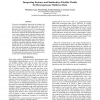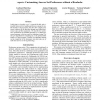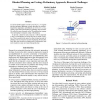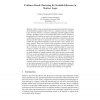57
Voted
AAAI
2015
9 years 9 months ago
2015
We present a probabilistic framework for learning with heterogeneous multiview data where some views are given as ordinal, binary, or real-valued feature matrices, and some views ...
67
Voted
AAAI
2015
9 years 9 months ago
2015
In this paper we describe asprin1 , a general, flexible, and extensible framework for handling preferences among the stable models of a logic program. We show how complex prefere...
AAAI
2015
9 years 9 months ago
2015
Spectral clustering, a graph partitioning technique, has gained immense popularity in machine learning in the context of unsupervised learning. This is due to convincing empirical...
64
Voted
AAAI
2015
9 years 9 months ago
2015
Much of the focus on finding good representations in reinforcement learning has been on learning complex non-linear predictors of value. Policy gradient algorithms, which directl...
AAAI
2015
9 years 9 months ago
2015
Many AI applications involve the interaction of multiple autonomous agents, requiring those agents to reason about their own beliefs, as well as those of other agents. However, pl...
60
Voted
AAAI
2015
9 years 9 months ago
2015
This paper describes an end-to-end learning framework that allows a novice to create a model from data easily by helping structure the model building process and capturing extende...
AAAI
2015
9 years 9 months ago
2015
In a recent position paper in Artificial Intelligence, we argued that the automated planning research literature has underestimated the importance and difficulty of deliberative...
AAAI
2015
9 years 9 months ago
2015
Markov Logic is a powerful representation that unifies first-order logic and probabilistic graphical models. However, scaling-up inference in Markov Logic Networks (MLNs) is extr...
AAAI
2015
9 years 9 months ago
2015
Planning in large partially observable Markov decision processes (POMDPs) is challenging especially when a long planning horizon is required. A few recent algorithms successfully ...
AAAI
2015
9 years 9 months ago
2015




